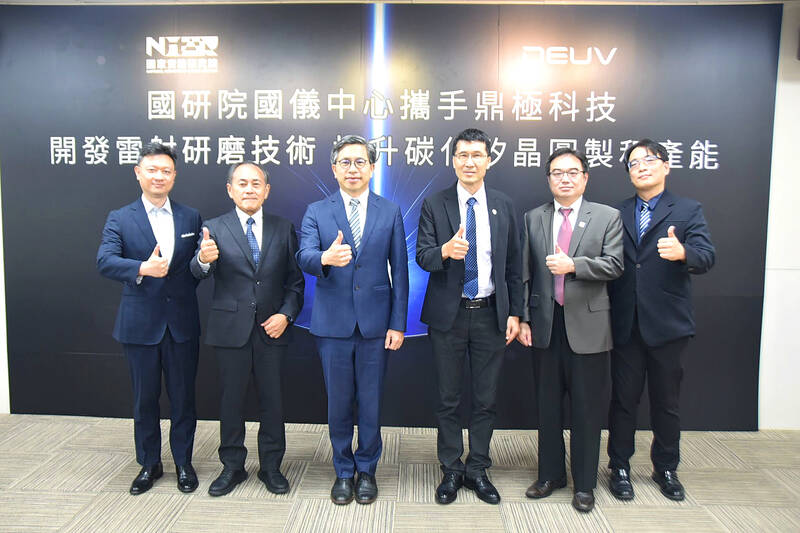The National Institutes of Applied Research’s National Center for Instrumentation Research has said that it has developed technology to help the semiconductor industry address the issue of increased scrap rates for semiconductor wafers resulting from the use of silicon carbide.
Institute researcher Lin Yu-hsuan (林宇軒) said semiconductors are being increasingly used in electronic vehicles, artificial intelligence hardware and green energy-related industries.
Such industries demand semiconductors that are functional in high-pressure, high-temperature and high-frequency environments, which require wafers to be made from silicon carbide, also known as carborundum.

Photo: Wu Po-hsuan, Taipei Times
Silicon carbide has a 9.2 rating on the Mohs scale — which is used to determine the scratch resistance of minerals — second only to diamond, which has a rating of 10, the institutes’ president Tsai Hung-yin (蔡宏營) said.
Silicon, which is commonly used in semiconductor production, has a rating of 7, meaning that silicon carbide is three times harder, Tsai said.
Damages to cutting tools used in processing silicon carbide increase expenses, while cutting takes six to 10 times longer than silicon, and grinding takes three to five times longer and costs more, he said.
Wafer scrap rates have reached up to 5 to 10 percent, a rate that is hard to bear for manufacturers when the price for a wafer is NT$300,000, he said.
The institute uses a nanosecond pulsed laser hitting wafers 100,000 times per second, and the heat softens the silicon carbide exterior until hardness reaches 2 percent of the original, he said.
While the use of picosecond and femtosecond laser technologies can obtain the same results, they cost more, Lin said.
Nanosecond pulse lasers allow the manufacturing productivity to increase by 30 percent, and reduce overhead per wafer from US$23.3 per wafer to one cent, as well as reducing scrap rates to lower than 1 percent, Tsai said.
The center has given exclusive authorization to Deuvtek Co to trial mass production, he added.
The maturation of the technology would enable Taiwanese companies to process other hard materials such as gallium nitride, ceramic substrates or other advanced semiconductor packaging materials, he said.
One can only see the practical challenges faced by the industry firsthand at the factory, Deuvtek president Shoichi Sakanishi said.
Laser-grinding technology helps reduce material waste and virtually eliminates stress during operations, Deuvtek CEO Chyan Jiunn-yih (錢俊逸) said.

US climber Alex Honnold is to attempt to scale Taipei 101 without a rope and harness in a live Netflix special on Jan. 24, the streaming platform announced on Wednesday. Accounting for the time difference, the two-hour broadcast of Honnold’s climb, called Skyscraper Live, is to air on Jan. 23 in the US, Netflix said in a statement. Honnold, 40, was the first person ever to free solo climb the 900m El Capitan rock formation in Yosemite National Park — a feat that was recorded and later made into the 2018 documentary film Free Solo. Netflix previewed Skyscraper Live in October, after videos

Starting on Jan. 1, YouBike riders must have insurance to use the service, and a six-month trial of NT$5 coupons under certain conditions would be implemented to balance bike shortages, a joint statement from transportation departments across Taipei, New Taipei City and Taoyuan announced yesterday. The rental bike system operator said that coupons would be offered to riders to rent bikes from full stations, for riders who take out an electric-assisted bike from a full station, and for riders who return a bike to an empty station. All riders with YouBike accounts are automatically eligible for the program, and each membership account

A classified Pentagon-produced, multiyear assessment — the Overmatch brief — highlighted unreported Chinese capabilities to destroy US military assets and identified US supply chain choke points, painting a disturbing picture of waning US military might, a New York Times editorial published on Monday said. US Secretary of Defense Pete Hegseth’s comments in November last year that “we lose every time” in Pentagon-conducted war games pitting the US against China further highlighted the uncertainty about the US’ capability to intervene in the event of a Chinese invasion of Taiwan. “It shows the Pentagon’s overreliance on expensive, vulnerable weapons as adversaries field cheap, technologically

NUMBERS IMBALANCE: More than 4 million Taiwanese have visited China this year, while only about half a million Chinese have visited here Beijing has yet to respond to Taiwan’s requests for negotiation over matters related to the recovery of cross-strait tourism, the Tourism Administration said yesterday. Taiwan’s tourism authority issued the statement after Chinese-language daily the China Times reported yesterday that the government’s policy of banning group tours to China does not stop Taiwanese from visiting the country. As of October, more than 4.2 million had traveled to China this year, exceeding last year. Beijing estimated the number of Taiwanese tourists in China could reach 4.5 million this year. By contrast, only 500,000 Chinese tourists are expected in Taiwan, the report said. The report